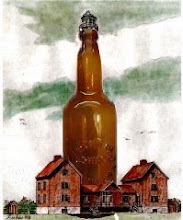 Goose Island Beer Co., the Chicago-based brewing powerhouse, announced this morning that it will be taken over by Anheuser-Busch (A-B) for $38.8 million.
Goose Island Beer Co., the Chicago-based brewing powerhouse, announced this morning that it will be taken over by Anheuser-Busch (A-B) for $38.8 million.Goose Island, whose legal name is Fulton Street Brewery LLC, is selling a 58 percent stake in the company to A-B for $22.5 million. The Craft Brewers Alliance, in which A-B holds a 32 percent stake, has agreed to sell its own Goose Island stake to A-B for $16.3 million. The Craft Brewers Alliance owns the remaining 42 percent of Goose Island.
St. Louis-based Anheuser-Busch is a wholly-owned subsidiary of Anheuser-Busch InBev N.V. (AB InBev), the world’s largest brewing company based in Leuven, Belgium. AB InBev was formed when InBev NV bought Anheuser-Busch Cos. in 2008.As part of the deal, A-B will also invest $1.3 million in the Fulton Street brewery to increase production capacity. Goose Island sold approximately 127,000 barrels of beer in 2010.
Brewmaster Greg Hall will be stepping down. Founder and president John Hall will stay on as CEO.
“Demand for our beers has grown beyond our capacity to serve our wholesale partners, retailers, and beer lovers,” Hall said in a statement. “This agreement helps us achieve our goals with an ideal partner who helped fuel our growth, appreciates our products and supports their success.”
He added that the “new structure will preserve the qualities that make Goose Island’s beers unique, strictly maintain our recipes and brewing processes.”
If approved by regulators, the deal is expected to close in the second quarter of 2011.
“These critically acclaimed beers are the hometown pride of Chicagoans,” said Dave Peacock, president of Anheuser-Busch, said in a statement. “We are very committed to expanding in the high end beer segment, and this deal expands our portfolio of brands with high-quality, regional beers. As we share ideas and bring our different strengths and experiences together, we can accelerate the growth of these brands.”
A-B’s move comes at a time when craft beer sales have surged, while major brewers’ sales by volume have been flat or decreased. Big brewers have been hoping to tap into craft beers’ growth without alienating drinkers who prefer craft brews to more mainstream ones.
Craft beer is expected to make up 11 percent of total beer consumption this year.
Although the Craft Brewers Alliance’s 2006 investment in Goose Island has technically exempted the brewer from craft-beer status, the company’s popular brands have shared the problem of other craft beers: increasing capacity to meet surging demand.
Goose Island is best-known for its 312 Urban Wheat Ale, and respected in craft circles for other products like Matilda and Bourbon County Stout. Goose Island has been outsourcing some production and seeking additional investment to expand capacity.
In an interview with the Tribune last month, brewmaster Greg Hall said the company’s sales had “outpaced our forecast in 2010, so that we weren’t quite ready for all of the growth we got.” Goose Island also hired an investment banker to assist the family in securing funds for expansion.
“Our long-term goal is to have a new brewery in Chicago,” Hall said. He said the company is buying new tanks for the current facility, “but you can’t just go to Wal-Mart” and buy them.
Several craft brewers have recently cut distribution in the face of straining capacity. The brewer Dogfish Head, which is based in Milton, Del., announced earlier this month that it would pull out of Tennessee, Indiana, Wisconsin and Rhode Island.
“The glass-half-full view is that we (and a handful of other U.S. craft breweries making similar moves) have to do this because the number of U.S. drinkers buying and enjoying craft beer are growing so quickly!” Dogfish founder and president Sam Calagione wrote on the company’s blog. “This decision will allow us to still get many different, exotic, Dogfish specialty and seasonal beers into our slightly smaller footprint. It will also ensure that more cases and kegs of our core, year-round beers will be available closer to home.”




